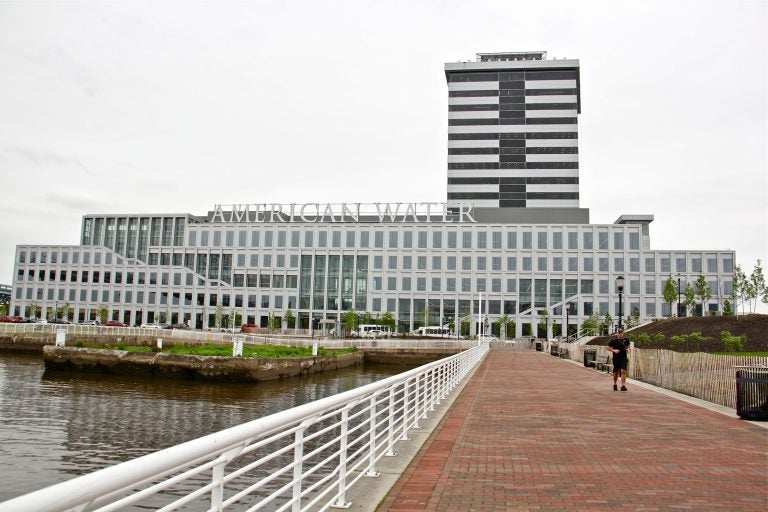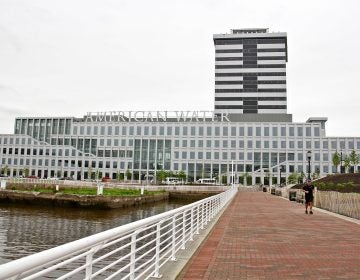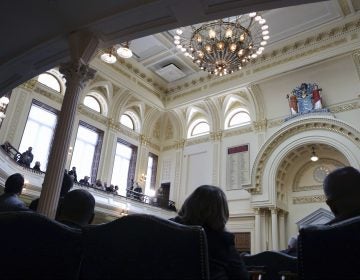In final report, N.J. task force finds more faults with state’s $11B tax break programs
The task force’s final report lays out a culture of “getting to yes” instead of ensuring companies delivered on promises to the state and communities.

Developments on the Camden waterfront, like the American Water corporate headquarters and the 18-story Camden Tower, receive substantial local tax breaks in addition to state tax incentives. (Emma Lee/WHYY)
The New Jersey task force formed by Gov. Phil Murphy to look into the state’s generous tax break programs released its final report Thursday, which contains new allegations of lax oversight among regulators and impropriety on the part of hired consultants.
“The [Economic Development Authority] has fostered a permissive culture of ‘getting to yes’ with applicant companies,” said Ron Chen, a Rutgers Law professor and chair of the task force, “which resulted in a predisposition of EDA personnel to approve awards for tax incentives and at higher amounts when possible.”
The $11 billion handed out in tax break awards has come under intense scrutiny since early 2018, when Murphy authorized a state investigation into a regime he suggested was overly generous and lacked the proper checks.
He referred to Grow New Jersey, one of the state’s more popular business incentives, as “a program more likely to have been drawn up in a smoke-filled back room than created for New Jersey’s future.”
The task force investigation also set up a political fight between the North Jersey Democrat Murphy and South Jersey power broker George Norcross, a longtime friend and ally of Senate President Steve Sweeney, D-Gloucester.
Norcross unsuccessfully sued to stop the investigation, part of which was focused on the $86 million tax break his insurance firm won to move to Camden.
On Thursday, the task force announced it had referred 12 companies whose awards totaled more than $578 million to the EDA and law enforcement agencies for further action. One of those companies is Conner Strong & Buckelew, the insurance firm run by Norcross.
“We are not aware of any reason why Conner Strong & Buckelew’s incentive award would be denied or modified and today’s report offers none,” said Daniel Fee, as a spokesman for the firm, which relocated its headquarters from Philadelphia and Marlton to Camden.
“The firm has substantially exceeded the number of jobs it promised to bring to Camden, complied with every request and requirement of the EDA and looks forward to the ultimate approval of its incentives,” Fee added.
A ProPublica/WNYC report found that companies with ties to Norcross received $1.1 billion worth of tax breaks to relocate to Camden, often from elsewhere in the state. And a previous task force report questioned whether other beneficiaries of the tax breaks with ties to Norcross ever really had considered moving jobs out of New Jersey.
Murphy, who commissioned a state comptroller report on tax incentives in 2018 before kickstarting the task force inquiry one year later, said he was dismayed by the results.
“I knew then that our system of corporate tax incentives was not producing the promised jobs, but I had no idea of the ugly reality waiting to be uncovered,” Murphy said in a statement. “This administration will not tolerate fraud or self-dealing and we will ensure that every dollar of taxpayer money is spent wisely and effectively.”
The report released Thursday found that hired consultants, which the task force said a majority of companies brought on to help with their tax break applications, often helped convince the EDA to give awards to firms that were not “at risk” of leaving the state. Jobs had to be at risk of going elsewhere to quality for a tax break.
Several companies told the EDA they were considering locating somewhere outside New Jersey even though that was not true, the task force said, and at least 15 companies claimed to be considering moving into the same Blue Hill Plaza complex on the New Jersey-New York border. The task force said the EDA was aware that different companies were using the same out-of-state location to show they were considering moving elsewhere, but that the agency did little about it.
The task force also found that the EDA provided scant guidance to staffers who were vetting applications for its Economic Redevelopment and Growth Program (ERG), which led to uneven enforcement of the statute and the agency’s rules.
Murphy let the Grow NJ and ERG programs expire last summer, and he and Sweeney have yet to agree on a new slate of tax incentive programs for the state, though both acknowledge that they are necessary to attract and retain businesses. Murphy wants a hard financial cap on the program; Sweeney has said he doesn’t support that.
But Special Counsel Jim Walden, a partner at the law firm Walden Macht & Haran LLP which worked on the task force’s investigation, said the lack of a cap on New Jersey’s previous tax incentive programs allowed them to be abused.
“The absence of any meaningful cap — of any cap at all — definitely created a situation where it was like pigs at a trough. They were oftentimes the largest companies, oftentimes the ones that needed it the least, and oftentimes some or all the benefits that they were purporting to give to the state were illusory.”

Get daily updates from WHYY News!
WHYY is your source for fact-based, in-depth journalism and information. As a nonprofit organization, we rely on financial support from readers like you. Please give today.





